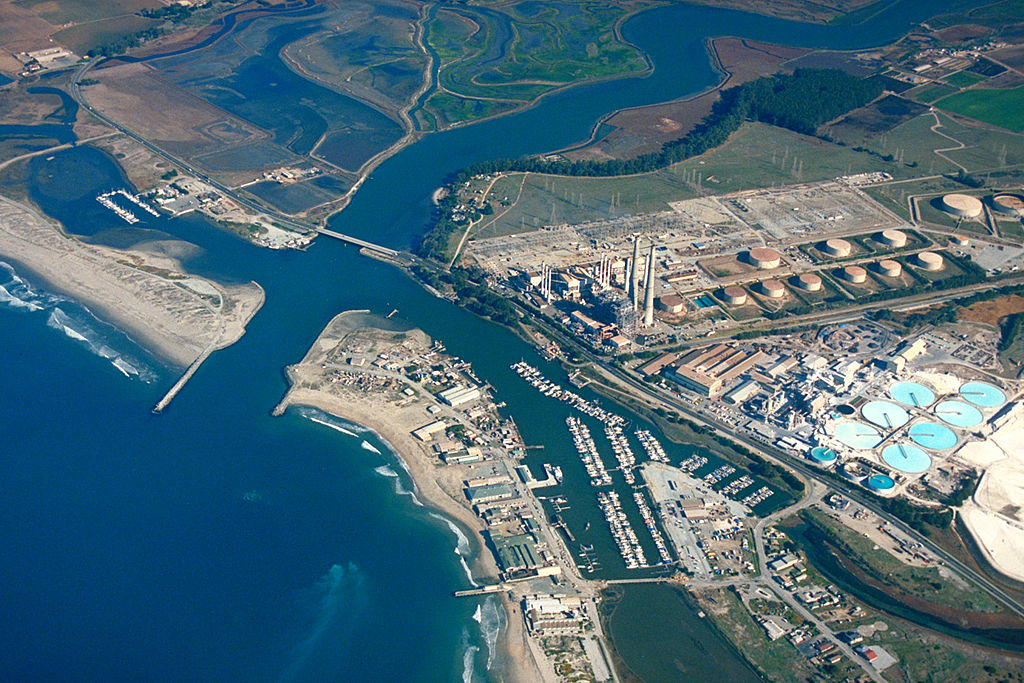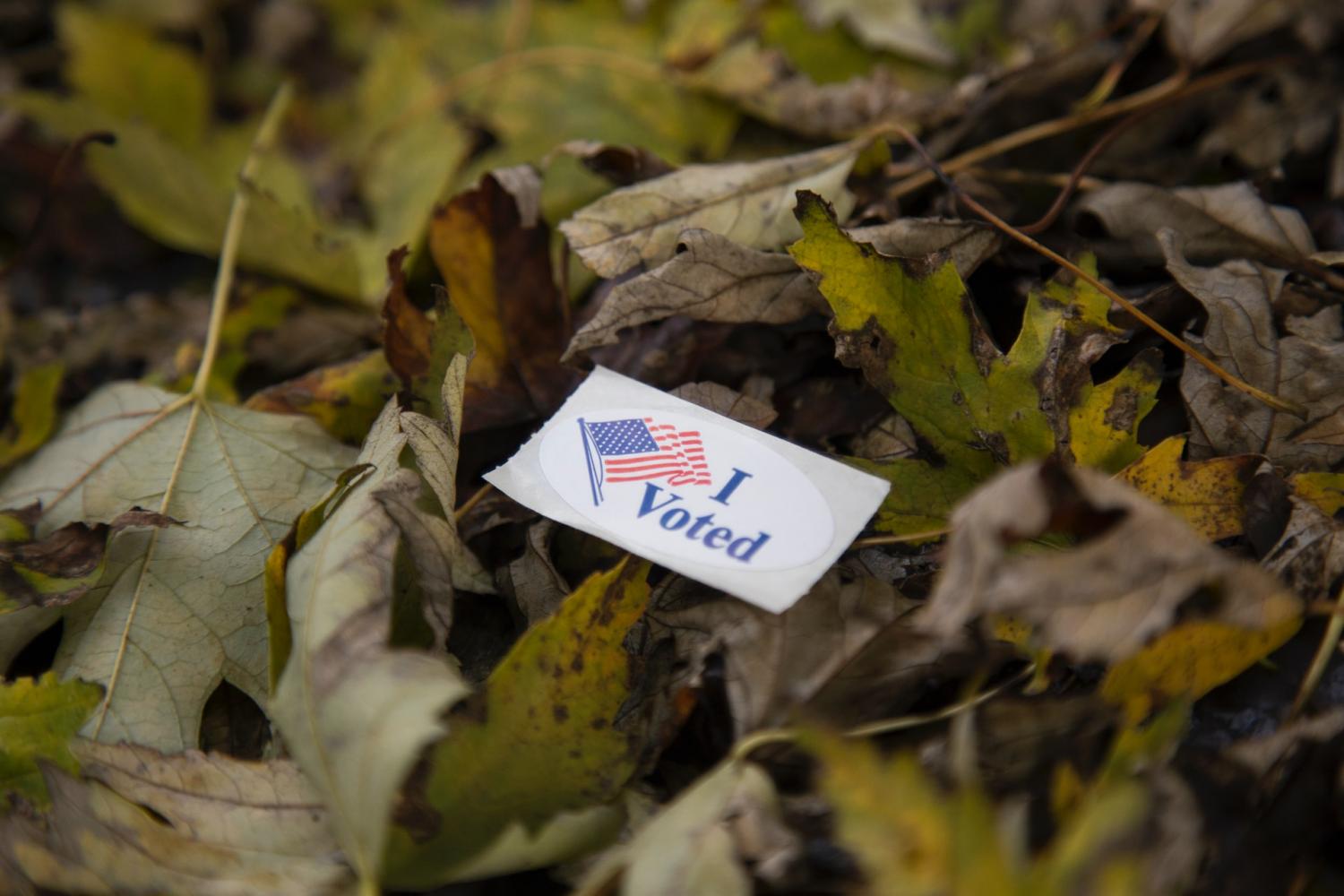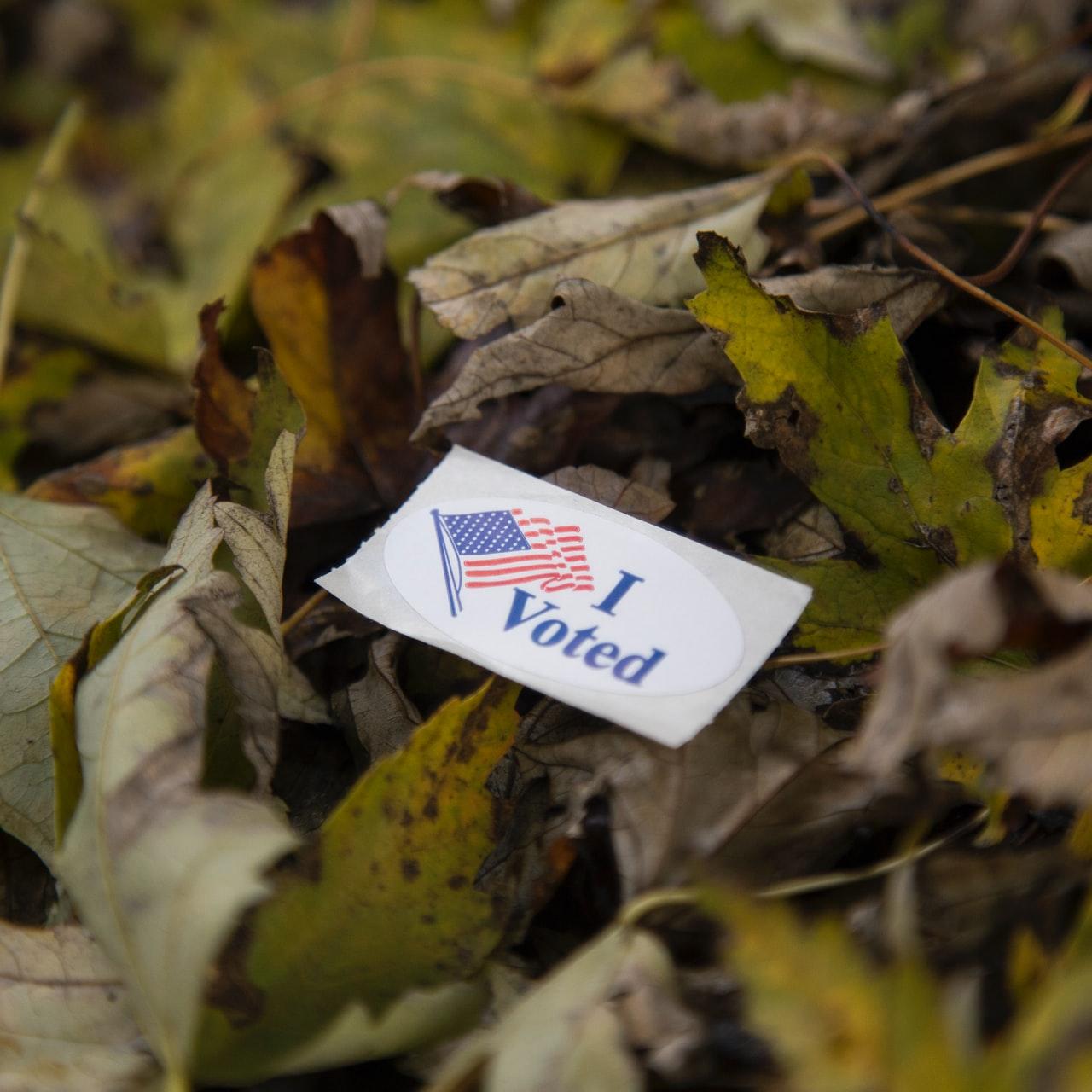It’s No Fluke! Battery Storage Is Booming Big Time on the Monterey Bay Coast


The ongoing COVID-19 crisis hasn’t prevented the nascent battery storage industry from growing over the past several months. And some of the largest sites are underway at some of the most random locations.
Most people who live in or near the Monterey Bay area on California’s central coast know Moss Landing as the sleepy hamlet about halfway between Santa Cruz and Monterey. Visitors to this tiny town wedged along California’s Highway 1 stop by for fresh seafood and scenic views of the local sand dunes. Many visitors also arrive during whale watching season, as they hope to catch the sight of the flukes or graceful movements of the different species of whales (as shown in the photo above) and orcas as they migrate up and down the Pacific coast.
In addition to whale watching, this town is also known for the unfortunate sight of the Moss Landing Power Plant, which dates back to 1949 and at one point was the largest power generation station in the Golden State. But over time those stacks were retired, and its systems were upgraded. Now the natural gas-fired Moss Landing plant can boast another superlative: It will soon be home to what will be the largest battery storage system in the world.
Earlier this spring, Texas-based Vistra Energy announced its intention to expand its already massive battery storage system adjacent to the Moss Landing power station. At its launch, the battery storage installation boasted 300 megawatts (MW) of power. This spring, Vistra said it would partner with the local utility, Pacific Gas & Electric (PG&E), to add another 100 MW unit to bolster this system, pending the approval California’s public utility oversight board.

The ambitious proposal took another step toward being switched on late last week with Monterey County’s planning commission unanimously voting to approve Vistra’s proposal.
"Our Moss Landing site provides a unique opportunity for extensive battery development with its existing infrastructure and the physical space needed for even more potential growth. Utilizing our existing power plant sites allows us to cost-competitively develop renewable and battery storage assets as we rotate our power generation portfolio toward carbon-free technologies," said Vistra’s CEO and president, Curt Morgan, in a public statement. "Vistra is appreciative of the opportunity to, once again, work with PG&E and the State of California to help integrate clean energy from renewable generation sources and ensure reliability of the electric system."
The project still awaits the approval of the California Public Utilities Commission (CPUC) but considering the state’s and local governments’ ambitious climate action goals, that bureaucratic hurdle should only be a matter of time.
Meanwhile, Tesla and PG&E are working together to build another battery storage installation at the Moss Landing site. Once all these energy storage systems are up and running, the site’s total storage capacity could exceed 1.1 gigawatt hours of energy storage – in other words, about 6 hours of power storage capacity. The entire system, according to PG&E, could save the utility about $100 million in reduced inefficiencies over a 20-year period.
Image credit: Humberto Braojos/Unsplash
Paying a Living Wage Can Help Companies Survive This Pandemic


With the news out that the U.S. economy contracted by almost a third in the last quarter — marking the worst GDP report ever — at first, now does not seem to be the right time to talk about paying what labor activists call a living wage. Companies have responded to such assumptions in kind by either keep wages flat or rolling back temporary wage increases for essential workers.
But at a point when many of us are tired of being stuck at home yet fearful of returning to the shopping mall or local bar, evidence suggests that rewarding workers who are showing up to do their jobs during this emotionally taxing period could actually pay off in several ways.
A new report from Just Capital confirms what other studies have indicated all along: Paying workers a living wage can result in less absenteeism, lower turnover, and more capable and motivated workers.
Just Capital researchers recently crunched data they have on companies and separated them by comparing a batch for firms that pay a living wage versus another batch that does not.
At a basic level, a living wage is defined as pay rate that allows a worker to meet the minimum standard of living where he or she lives. A living wage for a single person with no kids in Los Angeles County, for example, is just under $31,000 a year, versus a little over $24,000 in St. Louis.
The results showed that even though countless companies in the U.S. saw their performance crater during the first several weeks of the pandemic, companies that did pay a living wage tended to perform better than those who payed lower hourly wages. The discrepancy was most notable in early April when the media was rife with stories of countless small and large companies teetering toward bankruptcy.
But as more of the U.S. reopened later in the spring, those firms committed to a living wage still outpaced their lower-paying peers. The companies in the 25 percent who paid the highest wages gained more than a 12 percent return versus those in the lower quartile, which gained an average return on that labor of just over 1 percent.
“With many workers now facing increased economic insecurity in face of the COVID pandemic, responsible companies should consider paying their workers more,” the report reads. “This would allow them to focus on their jobs, which in turn can have a positive impact on the company’s bottom line.”
Discussions about employee engagement, a hot topic just a few months ago, have largely evaporated as companies have shed large parts of their workforce, save for the countless articles suggesting how companies can keep remote workers happy.
But as Congress continues to struggle with its passage of another version of a coronavirus stimulus bill, companies — especially the large retailers that have emerged stronger over the last several months — are now in the lead position to do what they can to ensure essential workers feel protected. Part of that challenge is standing up for your employees. But at a time when many are worried about how they can pay for food and rent, a living wage offers security while providing workers with the motivation to perform well while they are on the clock. In the end, looking out for your employees now can help secure resilience for the long term.
Image credit: David Emrich/Unsplash
New Threats, and Protections, in Store for Garment Workers as They Make PPE


Garment workers worldwide have a lot in common with meatpacking plant employees: Unfortunately, they work in close quarters, find it nearly impossible to follow social distancing guidelines, and face many on-the-job risks while making products consumers expect to be both affordable and of high quality. Reports keep surfacing of garment workers at factories that have shifted their operations to make personal protective equipment (PPE) who themselves have contracted COVID-19.
The ironic risks garment workers face as they make PPE
The latest incidents have been occurring in the Garment District of Los Angeles, the epicenter of apparel manufacturing in the U.S. Among the tens of thousands of workers employed in this sector, approximately half are undocumented immigrants. The result is a culture in which workers are afraid to speak out about their wages and working conditions. The lack of transparency in this industry has made it difficult to track the origins of COVID-19 outbreaks. The 300 cases attributed to one factory alone last week is a symbol of how the Los Angeles area has been one of the largest coronavirus hotspots in the U.S.
Factories in countries that have much larger garment industries, such as Bangladesh, are also seeking to relaunch their operations and get back into business by manufacturing PPE. The catch is that more garment workers will confront more threats to their health from the virus, ironically as they make products designed to protect other people from being stricken by it.
A tool to boost transparency in the PPE sector
To that end, the people behind the Open Apparel Registry (OAR), an open-source online tool that maps garment factories worldwide, say they now have the data needed to help monitor sites where workers are making PPE.
OAR announced that manufacturing sites of various sizes can be monitored, whether they are small work studios with a handful of workers or far larger factories. Supply chain and procurement managers can access the database for free and research factories based on the type of products (such as gloves and masks) they manufacture. Anyone, such as human rights advocates working within an NGO, can access OAR’s tool for free. All they need to do is register for an ID.
As of now, the PPE manufacturer option now provided by OAR has a handful of datasets. The organization is currently seeking more data, which would provide buyers of PPE more insight and transparency in their supply chains.
Image credit: Vera Davidova/Unsplash
Aligning Corporate Ambition with an Ever-Changing World


Goal-setting is familiar territory for most major multinational corporations. But as the needs and demands of our world change rapidly — on issues from climate change and resource scarcity to equity and social justice — companies are challenged to make sure their ambitions evolve in kind.
Still, it’s rare to see a company revisit past goals still in progress and increase their ambition to align with what’s needed. As it transitions from its Sustainability 2022 framework to a set of more high-reaching goals for 2030, leading global consumer packaged goods company Kimberly-Clark offers a case study in how companies can go about changing their vision to align with what the world requires today.
Goal-setting must be purpose-fit for a challenging world
Before the global coronavirus pandemic, the world was already grappling with a host of social and environmental challenges.
The climate crisis remains dire. U.N. data indicates that government commitments fall far short of what’s needed to realize the goals of the Paris climate agreement. And despite progress in some areas, the world is also falling behind on achieving the U.N. Sustainable Development Goals (SDGs) by 2030, according to the U.N.'s annual Sustainable Development Goals Report, with advances “offset elsewhere by growing food insecurity, deterioration of the natural environment, and persistent and pervasive inequalities."
Both individuals and business leaders think the corporate world must step up its actions to fill these gaps. Over 90 percent of citizens think it’s important for the private sector to support the SDGs, for example, according to data from PwC. Yet more than 80 percent of the world’s largest companies are unlikely to meet the targets set out in the Paris climate agreement by 2050, according to a study of almost 3,000 publicly-listed companies and their climate disclosures.
Corporate action is ramping up. To date, nearly 1,300 leading businesses around the world have made climate commitments through the We Mean Business coalition’s Take Action campaign. More than 240 companies committed to source 100 percent renewable energy as part of the RE100 initiative. And 285 companies have had greenhouse gas (GHG) emissions reduction targets verified through the Science-Based Targets initiative (SBTi) in line with the Paris Agreement.
Sticky challenges demand bold ambitions
For Kimberly-Clark, which counts itself among those with goals verified by SBTi, an outside-in perspective is integral to the goal-setting process and matching ambition with the global agenda, said Lisa Morden, the company’s vice president of safety and sustainability.
“There is more scientific evidence around pressures and impacts on natural systems and the environment in general,” Morden told TriplePundit. “There are big, sticky, difficult challenges all around us — and those challenges require a pretty bold ambition. We’ve always set targets that we knew were a stretch, but in the last few years, we’ve worked on trying to understand what Kimberly-Clark’s contribution to the Paris accord, for instance, might look like.”
Kimberly-Clark’s 2022 Sustainability Framework, set in 2015, was updated with a new set of goals announced earlier this month. Many of the 2022 goals were already surpassed. The company now aims to reduce its plastics, water, carbon and natural forests footprints 50 percent by 2030. That includes reducing its absolute greenhouse gas emissions by half in just a decade from Scope 1 sources, which are the emissions from its own production, and from Scope 2 sources, those created from producing the energy a company purchases to run its business. In addition, Kimberly-Clark aims to cut its Scope 3 emissions from purchased goods and services and end-of-life treatment for sold products by 20 percent.
The company decided to take a fresh look at its goals about a year ago, Morden explained: “A lot has changed in terms of what we feel like we can do and what we feel like we should do as a result of the external context we're operating in. We said, ‘It's probably time to take a step back and ask, ‘Are we being big and bold enough?’ We felt it was time.”
The art of the stretch goal
Since 1995, Kimberly-Clark has had a five-year cadence of setting goals (the seven-year goals set in 2015 were an outlier, set to coincide with the company’s 150th anniversary in 2022). With each round, goals were adjusted, the company set more ambitious objectives, and the portfolio of programs expanded "as more knowledge came into the system,” Morden told us.
“It’s worked very well for us,” she explained. “It’s a source of engagement for our teams and with each cycle we’ve been able to innovate and stretch further.”
For the 2030 goals, two areas in particular reflect that stretch. Within its GHG emissions reductions, it was a first for the company to set an absolute target to reduce Scope 3 emissions by 20 percent.
“The Scope 3 piece is a very different challenge than we are used to,” Morden said. “We’ve had to apply some assumptions around what we can achieve that aren’t based in as much experience as some of our other programs." Those considerations depend in part on alternative materials development that is underway, how key core suppliers will drive reductions, and the success of the company’s circular economy focus.
Part of that focus is another bold goal: reducing Kimberly-Clark’s plastics footprint by 50 percent and having 100 percent reusable, recyclable, or compostable packaging by 2025. “We’ve amped up our focus on plastics significantly,” Morden said. “We’re looking at bio-based plastics, renewable plastics, plastics that can be recycled more easily, and even biodegraded or composted more readily.”
For corporate goal-setting, the key to success is an inclusive process
For Kimberly-Clark, the key to success with continually raising its ambition has been an inclusive process of goal-setting that reaches into every corner of the company.
“We've learned that the act of setting the goals with your business and functional teams , and connecting that to the vision or purpose of the company, is key to engagement and activation of the ambition” Morden said. “There's a whole layer of strategy deployment activity that sits below the goals themselves. This is where the rubber hits the road in terms of bringing the ambition to life.”
For the goal-setting to work, it can’t be top-down, she added. “When people have their fingerprints on the goals — and [they are] included in the process of learning, exploring and developing the pipeline of initiatives — it's a very different kind of engagement model. During every cycle that we've gone through since the early ‘90s, we've gotten better at that. Our employees are increasingly more excited to participate and engagement is expanding from where it started in supply chain and manufacturing, into product and material innovation, and now into helping our brands further their purpose in the world.”
For business leaders seeking to redefine their goal-setting process in an ever-more complex world, Morden’s advice is as follows: “Don’t be afraid of the bold ambition. Be sure that it is reasonable and appropriate to your footprint, to who you are as a company, to what your raw materials look like, to who your customers, consumers and stakeholders are—be sure it's a relevant focus. And then, in your strategy deployment, work with the different functions and regions and stakeholders internally in the company, get their fingerprints on it, bring them along the entire journey. With a little bit of rigor and discipline, and an inclusive process, we’ve found it’s possible to not only design ambitious goals but to actually deliver on them.”
This article series is sponsored by Kimberly-Clark and produced by the TriplePundit editorial team.
Image credit: Jianxiang Wu/Unsplash
Your Company Agrees Black Lives Matter. Then What? Learn More, Wednesday, August 5 at Noon ET


The Black Lives Matter movement is finally gaining traction, though it was too late for just a few of these citizens we’d like to mention.
Trayvon Martin, Eric Garner, Mike Brown, Tamir Rice, Freddie Gray, Sandra Bland, Alton Sterling, Philando Castile, Ahmaud Arbery, Breonna Taylor, George Floyd.
As the list of black men and women murdered by police and racist vigilantes grows, the call for racial equity and a fair criminal justice system becomes louder.
Recent corporate declarations of standing with Black Lives Matter are encouraging, but such statements have little impact if they’re not backed up by effective, sustained advocacy calling for a fair and equitable justice system. One interesting trend we’ve seen that it’s often the smaller companies with far more at stake that have been far more vocal.
The stubborn fact is that the business community can do much better.
Join TriplePundit senior editor Mary Mazzoni on Wednesday, August 5 at 12 p.m. ET for a live conversation with the Responsible Business Initiative for Justice (RBIJ) and its partners on what businesses can do to keep the spotlight and momentum on criminal justice issues.
Our live panel will also discuss how companies can help end police brutality and systemic racism, target their support to create real, tangible impact and use their influence to advance racial equity.
3p's parent company, 3BL Media, launched the “Learn From Home” series as the U.S. workforce went into self-isolation in March. Leveraging the expertise of 3p, which we’re proud to say has been covering sustainable business since 2005, the series focuses on bold and authentic corporate leadership.
Panelists for “Beyond Statements: How to Use Your Voice for Change” include:
Moderated by Mary Mazzoni, Senior Editor, TriplePundit
Celia Ouellette, Chief Executive Officer, RBIJ
Ashish Prashar, Global Communications Director, Publicis Sapient
Jeff Korzenik, Chief Investment Strategist, Fifth Third Bank
Conroy Boxhill, Managing Director, Porter Novelli-Atlanta
While we’ve got your attention, be sure to sign up for the weekly Brands Taking Stands newsletter, which arrives in your inbox every Wednesday.
Image credit: Koshu Kunii/Unsplash
Jo-Ann Stores Puts Foot Down on Anti-Maskers


Ohio-based fabric and crafts retailer Jo-Ann Stores has been quietly building its own social responsibility profile over the past few years. Now it appears that the COVID-19 crisis has sparked a new wave of activism for the company as it takes on anti-maskers.
Earlier this month, Jo-Ann joined a wave of major U.S. retailers requesting all customers wear masks regardless of state guidelines. Last week, Jo-Ann’s president and CEO, Wade Miquelon, upped the ante by stating that the company is willing to lose customers over its stand on public health.
A fabric store shames anti-maskers
Jo-Ann announced its new mask policy on July 23 in an open letter to customers from Miquelon. The wording of the letter is interesting, in that Miquelon begins by underscoring the need for individual protection and ends with a ringing call for national action.
“We have required facemasks for store Team Members to protect our customers, and we want to extend that protection to all who are in our stores,” Miquelon begins.
“As such, beginning Monday, July 27, we respectfully encourage all customers – regardless of local mask mandates — to wear a facemask or covering whenever you are in a Jo-Ann store,” he continues in bold face.
Though the “respectfully encourage” language is mild enough, the letter concludes with a not-so-subtle dig at anyone who may walk into a Jo-Ann store without a mask.
“Thank you for all you are doing to help protect the nation by making and wearing masks in public, and for inspiring others through your creativity and generosity,” Miquelon writes.
With 850 stores in 49 states, that appeal to patriotism and national action will reach a wide audience — as will the message that anti-maskers are not helping to protect their communities. In addition, to individual shoppers, this message reaches many small business owners who purchase supplies from Jo-Ann, and it may ripple out to have an impact on their customers as well.
Jo-Ann is willing to lose customers over masks
Miquelon personally doubled down on the mask issue in an interview with CNN on Saturday, in which he stated that Jo-Ann was prepared to lose customers due to its new mask policy. Previously, the company only required masks in stores where state guidelines required them.
"This is the right thing to do," Miquelon said. "So, for the very few minority [of people] that don't want to comply, I think those are probably customers that we're willing to lose just because of the situation that we're in.”
Miquelon also underscored how retail employees have been put at risk by the absence of a strong national policy on masks — and sent a pointed message to anti-maskers as well. “I just don't want to see an employee get hurt,” he said. “Our people didn't sign up for that. They're just trying to be a good citizen and earn a living.”
The quiet before the social responsibility storm
While Jo-Ann was not the first major retailer to require wearing a mask, Miquelon has propelled the company front and center on the mask issue. Combined with the letter, Miquelon’s personal statement positions Jo-Ann and its loyal customers on the moral high ground, in stark contrast to members of the public — and elected officials — who downplay the effectiveness of masks.
Jo-Ann’s moral stance, along with its vocal calling out of anti-maskers, together make social outliers of individuals who react emotionally and violently when asked to wear a mask.
All of this may seem like a bolt out of the blue for a homey arts-and-crafts retailer. However, a hint of social activism appears in the company’s vision of being “the inspirational leader that helps everyone find their Happy Place.”
Before anti-maskers made headlines, Jo-Ann took the lead fighting COVID-19
That vision took concrete form early in the COVID-19 outbreak. On March 20, Jo-Ann announced that its in-store classrooms were open free of charge, with COVID prevention precautions, to customers for making and donating masks and other protective gear to frontline health workers.
“Participating locations will offer sewing machines, materials and guidance to help customers safely make facemasks and covers, gowns and other items to donate to America’s hospitals,” the company stated. “Jo-Ann will provide and donate 100% of the supplies needed for these projects for those who come in to make.”
Additionally, Jo-Ann offered its stores as collection points for sewers making masks and other items at home. The company also offered to help hospitals secure supplies of fabric and other materials they may need, partnering with Neiman Marcus and David’s Bridal in the effort.
The company followed up on June 24 with a campaign that enlists customers in a nationwide “Masks for Schools” effort ahead of the re-opening of schools this fall. The mask donations will go to underserved students through Jo-Ann’s longtime partnership on school supplies with the Kids In Need Foundation.
What’s next for Jo-Ann?
While Jo-Ann and other retailers have not directly confronted the Donald Trump administration in so many words, their actions in support of masks stand as a strong rebuke to an administration that has routinely rejected science in its response to the COVID-19 outbreak, as it has in other areas.
In that regard, two of Jo-Ann’s other recent actions appear to support a science-based approach to social responsibility, as well as youth empowerment through learning.
In 2018, the company formed a collaboration with the National 4-H Council on a hands-on learning initiative. The 4-H program is the largest youth development organization in the U.S., and it is rooted in a century-old U.S. Department of Agriculture initiative aimed at sharing science-based knowledge with the public.
The collaboration builds on a rewards card donation program benefiting 4-H, which Jo-Ann launched in 2017. The store also carries a line of 4-H themed patterns among its fabrics.
In 2017, the company also formed a similar partnership with Girl Scouts of the USA. “GSUSA offers girls the opportunity to develop leadership skills through programming focused on science, technology, engineering, and math (STEM); the outdoors; life skills; and entrepreneurship,” Jo-Ann noted in a press statement announcing the new collaboration.
Now that Jo-Ann has come down firmly on the side of science on COVID-19 response, it will be interesting to see where the company’s next foray into social responsibility will lead it – and how the anti-maskers will respond.
Sign up for the weekly Brands Taking Stands newsletter, which arrives in your inbox every Wednesday.
Image credit: Leon Kaye
Energy Companies, Utilities and Banks Complicit in Funding Racist Policing Across the U.S.


Keeping the lights on across America’s bloated prison system surely has its financial benefits, especially for companies in the finance and energy sectors that have helped make racist policing tactics endemic in the U.S.
The Public Accountability Initiative (PAI) recently released the results of an investigation into the strong ties between police foundations and U.S. utilities, fossil fuel companies and banks. The report leaves a huge blot on the reputation of corporate America, which over the past several weeks has largely knotted itself into a pretzel as business leaders have tried to prove companies are in alignment with the Black Lives Matter movement.
Funding and enabling racist policing: how it works
According to PAI’s report, the energy and power generation sectors, along with the financial companies that have funded them over the years, have been active in contributing funds to police foundations in major U.S. cities. These foundations raise money to acquire weapons, surveillance technology and equipment, going beyond what municipal budgets have already been providing police departments. The links between this corporate support for racist policing and environmental degradation are especially visible in major energy producing states like Texas and Louisiana, the report reveals.
Furthermore, these same companies often sponsor parties and fundraisers, including a $5.5 million bash for New York City’s police foundation last year. Such galas offer a stark reminder that police departments and the powerful unions backing them have ongoing generous support of some of America’s largest corporations.
The copious amounts of spending add to what is often anywhere from the 20 to 45 percent of municipal budgets that cities allocate toward local policing efforts. In addition, the acquisition of military hardware, guns, drones – you name it – often occurs with little public oversight, so the racist policing continues with little impunity.
The report's authors go on to explain how the events that have unfolded in U.S. cities such as Atlanta and Portland are partly a reaction to this dynamic between companies and police foundations:
"The ongoing protests have emphasized that police exist to enforce a racist social order that protects corporations, capital, and buildings rather than black and brown lives. Police foundations are a key space for orchestrating, normalizing, and celebrating the collaboration between corporate power and the police."
A beneficial relationship at the expense of communities of color
The energy companies that PAI called out in its report include Chevron, Marathon Petroleum, Shell and Valero. Each of these companies has its share of critics accusing them of polluting communities of color, while funding police departments in cities in which they have operations. Further, these same companies’ executives often have a seat on local police foundations’ boards of directors or take in active role in assisting with these groups’ fundraising efforts.
Utilities that have similar relationships with police foundations, according to PAI, comprise a roster that lists Detroit Edison, Exelon, Entergy and Georgia Power.
PAI’s researchers have also documented the relationships between America’s financial industry, the energy and power companies they fund, and how their connections with police foundations illustrate how fighting back against systemic racism in the U.S. will surely be a tall order.
For example, Bank of America, by at least one account, is a huge funder of the global energy sector, with its inking of more than $150 billion of financing directed to fossil fuel companies between 2016 and 2019. Besides the loans, the bank has either cut large checks or has a seat on the board of various police foundations that stretch coast to coast, from Los Angeles to New York, according to the report.
It turns out this financial giant is also “on watch”
BlackRock, which just recently put dozens of companies “on watch” over their environmental and sustainability performance, is also a major investor in fossil fuel companies, according to a 2019 Guardian report. Larry Fink, BlackRock’s CEO, who makes headlines annually for his annual public letter to corporations urging them to change how they conduct business, is also a donor to New York City’s police foundation. One social justice organization, Color Of Change, recently urged Fink and BlackRock to cut its ties to that foundation.
Reversing this trend and its impact on racist policing will be an uphill fight, acknowledges PAI. “As demands continue to rise to defund the police and reinvest in Black and Brown communities, as well as to divest from the fossil fuel industry and reinvest in environmental justice and a just transition, the fossil fuel industry power structure presents a common foe for these interconnected fights,” the report’s authors concluded.
Sign up for the weekly Brands Taking Stands newsletter, which arrives in your inbox every Wednesday.
Image credit: Tito Texidor III/Unsplash
Athletes Believe Voting Rights Should Be a Slam Dunk. Shouldn’t Companies, Too?


It’s a stretch to say COVID-19 disrupted our voting and election systems here in the U.S. As is the case with many of our current social and political challenges, the pandemic merely exposed the deep flaws and unfairness in how citizens are too often denied their voting rights. We've seen this play out in the long lines in the Wisconsin and Georgia primaries.
This current reality unfolded over time largely by design: The Founding Fathers didn’t trust the people to vote directly for president, and states with smaller populations wanted guarantees that their rights wouldn’t be overrun roughshod by what were the largest states in late 18th-century America: Virginia and Pennsylvania.
But those technicalities don’t excuse the fact that now, in the 21st century, far too many U.S. citizens confront hurdles, state by state, when it comes to exercising their right to vote. That is especially true in Florida, where over a million formerly incarcerated citizens who have already paid their debt to society have been denied access to the ballot box.
To that end, LeBron James’ voting rights coalition, More Than a Vote, is determined to raise the funds needed to pay off the fees imposed on citizens with past felony records so they can cast their decisions at the ballot box during this November’s federal election.
The problem in Florida is that in the 2018 election, voters by almost a 30-point margin approved Amendment 4, which reinstated the voting rights to an estimated 1.4 million Floridians who had past felony convictions. The state’s legislature and governor, however, soon responded by passing a law that required those same citizens to pay any outstanding fines, fees and other financial penalties before they could vote again.
In swoops James and his organization, which is now partnering with the Florida Rights Restoration Coalition (FRRC). The Orlando-based group has established a “fines and fees” fund to help Floridians pay off any such debts. More Than a Vote announced last week it would raise $100,000 and contribute it to FRRC’s fund, which to date has raised over $1.5 million for this campaign.
More Than a Vote has won the support of additional professional athletes, including Miami Heat forward Udonis Haslem, who last week told Politico, “Your right to vote shouldn’t depend upon whether or not you can pay to exercise it.”
While professional athletes and actors, along with former First Lady Michelle Obama, are leading the fight to ensure U.S. citizens’ voting rights, the private sector has been relatively silent.
The silence is deafening: Fears of uncertainty over what could happen this November, should the presidential election be a close one, would rattle the markets and risk even more economic chaos in addition to how the COVID-19 pandemic has already wreaked havoc across the U.S.
But despite those threats, the roster of companies speaking out is rather thin.
True, some coalitions working on bolstering voting rights are out there, including Time to Vote, which made some waves before the 2018 midterms, but has been silent since February. Patagonia is a leading example of a company that has been very vocal about voting rights, taking many steps including the closing of its doors so employees could vote on Election Day. The outdoor clothing and gear company is also partnering with Business for America, a nonprofit group that is pressuring the U.S. Congress to reform federal voting laws and secure the funds necessary so elections can run smoothly across the country.
Few companies, however, are willing to speak out on ensuring that U.S. election laws work for everyone, despite the fact that the current polarization of our political systems doesn’t bode well for either the economy or our collective well-being.
“This system disincentivizes elected leaders from working together to identify risks, overcome obstacles, and reach consensus on common-sense solutions so we can run safe, secure, and accessible elections — even during a public health crisis,” Business for America wrote in a Medium post earlier this year. “Political dysfunction and election chaos are bad for our businesses, employees, customers, communities, and country.”
Sign up for the weekly Brands Taking Stands newsletter, which arrives in your inbox every Wednesday.
Image credit: Josh Carter/Unsplash
Will Power is Key to Tackling the Ocean Plastic Crisis


As Plastic-Free July draws to a close, the looming ocean plastic crisis is still growing by the day. However, there is light at the end of the tunnel. A new scientific study indicates that solutions to much of the problem are already at hand. One important missing ingredient is will power, and that is where leading brands have an opportunity to shine.
New study demonstrates pathways for taking on the ocean plastic crisis
First, the good news. Earlier this month, the highly respected journal Science published the results of a two-year, international study titled, “Evaluating scenarios toward zero plastic pollution.”
The study was conducted under the auspices of the Preventing Ocean Plastics Campaign of the Pew Charitable Trusts.
Based on a time frame of 2016 to 2040, the first-of-its-kind study modeled five pathways for taking on ocean plastic and other forms of plastic pollution.
“While no silver bullet exists, 78 percent of the plastic pollution problem can be solved by 2040 using current knowledge and technologies and at a lower net cost for waste management systems compared to [business as usual],” the study concluded.
Those findings validate the efforts of business leaders who are working to cut down on plastic waste.
Writing for CNN last week, reporter Helen Regan noted that the five pathways involve the entire supply chain, from reducing single-use plastic in manufacturing to ramping up recycling and reuse.
The study concluded that this combined approach can actually save money for governments. That provides businesses with a bottom-line basis for advocating in support of stronger policies that cut down on plastic waste.
How “invisible” workers can make a difference on ocean plastic
One particularly interesting result of the study points to a solution that provides decent jobs for underserved communities around the globe.
The study outlined several significant shortcomings in the global waste management infrastructure, including recycling capacity, landfills and incinerators. The most important bottleneck, though, is in collection services.
Study co-author Dr. Winnie Lau told CNN that “billions of people” lack formal collection services.
To a great extent, that gap is being filled by networks of freelance waste-pickers who labor under unsafe, unhealthy and unstable conditions.
By organizing waste-pickers into a respected economic and environmental force, the collection rate could be increased significantly while improving community well-being.
A movement in that direction is already taking shape, as illustrated by the nonprofit Global Alliance for Incinerator Alternatives (GAIA).
For businesses seeking ways to make a significant impact on ocean plastic, support for organizations like GAIA is a good place to start.
And now, for the bad news
With solutions at hand, a 78 percent reduction in plastic waste sounds impressive.
Unfortunately, it is not.
The scenario mapped out by the research team found that “even with immediate and concerted action, 710 million metric tons of plastic waste cumulatively entered aquatic and terrestrial ecosystems” by 2040.
“To avoid a massive build-up of plastic in the environment, coordinated global action is urgently needed to reduce plastic consumption, increase rates of reuse, waste collection and recycling, expand safe disposal systems and accelerate innovation in the plastic value chain,” the authors warn.
Public policies that continue to support plastic industry stakeholders share part of the blame. The rest lies squarely on the shoulders of consumers.
“Plastic pollution is globally ubiquitous. It is found throughout the oceans, in lakes and rivers, in soils and sediments, in the atmosphere, and in animal biomass,” the authors write. "This proliferation has been driven by rapid growth in plastic production and use combined with linear economic models that ignore the externalities of waste. A sharp rise in single-use plastic consumption and an expanding ‘throw-away culture’ have exacerbated the problem.”
Businesses engage consumers on plastic waste
While the outlook is dire, the new study indicates that businesses are on the right track when they urge their customers to be more conscious about plastic waste in general, and the ocean plastic problem in particular.
Beverage and food brands are beginning to take the lead in that regard. One good example is Bacardi, which has leveraged the global plastic straw campaign to draw attention to the ocean plastic problem.
AB-InBev’s Corona brand has adopted a similar approach by experimenting with biodegradable six-pack rings, and spirits leader Diageo is introducing a paper pulp bottle for its Johnnie Walker brand.
Other leading brands, including Coca-Cola and McDonald’s, are also taking more steps to reduce plastic while raising consumer awareness.
Companies that do not rely on single-use packaging can also take action by identifying consumer behaviors that contribute to the problem.
That movement is already under way in organized sports, where fans are encouraged to recycle. However, there are other opportunities that are not being exploited. The auto industry, for example, could be more proactive in discouraging drivers from throwing bottles, cans and other trash out of cars.
Companies can also scout for new alliances that reduce plastic waste. One good example is the collaboration between UPS and the startup Loop to promote reusable food containers. Kitchen appliance manufacturers could hitch a ride on that effort, too.
New recycling and upcycling technologies are also on the horizon, but those solutions may be years away.
In the meantime, leading brands can make a big difference by exercising creativity and seeking new opportunities to reach consumers with positive messages about their contributions to a healthier, more sustainable future.
Image credit: Brian Yurasits/Unsplash
Ecolab Has a Sustainability Plan for the Hospitality Sector


Image: Between laundry, food, cleaning and, yes, swimming pools, 10 percent of hotels’ utility bills are linked to water consumption. Ecolab, a $13 billion company, says it has a plan to help industries, including the hospitality sector, become far more sustainable.
Ecolab is a 97-year-old company that provides consulting services and solutions on water, hygiene, and infection prevention to the food, healthcare, hospitality and industrial markets. In a bid to show its leadership over the next decade, the company recently launched its 2030 Impact Goals for streamlining both its own operations and how it will approach its work with customers.
For its customer-driven work, Ecolab aims to help the industries with which it works by conserving 300 billion gallons of water annually while helping its customers become carbon neutral by reducing greenhouse gas emissions by 4.5 million metric tons.
When looking at its customer base, the company will face many challenges in executing this strategy over the next 10 years. The hospitality industry, in particular, has an uneven success rate in meeting sustainability goals. But Ecolab, with its presence at 3 million commercial locations, is primed to meet and even exceed these goals.
Ecolab could rethink how the hospitality sector approaches sustainability
With much of the world not traveling during the coronavirus pandemic, the hospitality industry has taken a major financial hit. But hotels will fill their rooms again, and they will once again be dealing with big utility bills.
One of the problems facing hotels when it comes to energy and water use is the same as apartment buildings: the split incentive. The people who build or own hotels are typically not the people who manage or run them. Those that do typically have more robust sustainability achievements as opposed to those who rely on investor-owned properties. Appliance and equipment upgrades have an upfront cost, which may not translate into savings in short-term profit statements.
Hotels are responsible for about 1 percent of global greenhouse gas emissions in normal times, and they are also significant water users, from laundry to food services to meeting guests’ needs. About 10 percent of a hotel’s utility bill is for water. An important thing to note about Ecolab’s goals is that one of the ways it intends to help customers reduce their greenhouse gas emissions is through water conservation and better water management practices.
This matters for two reasons: Looking at emissions and water holistically increases the opportunities and efficiencies in any strategy deployed as water conservation measures are typically cheaper to implement than energy-efficiency measures. The state of California found that utilities could achieve the same level of energy reductions using water conservation as they could using traditional energy-efficiency measures, but at half the cost. For an industry already faced with plummeting revenues, such a strategy could be an important selling point.
The global hospitality sector has set ambitious goals, but could use a lift
The hospitality industry is vast, with every conceivable size, budget, and level of commitment to sustainability represented. The industry as a whole has set significant goals and made commendable improvements. For example, the International Tourism Partnership (ITP) states that the industry must reduce emissions by 66 percent by 2030 to stay within the acceptable 2 degrees Celsius threshold set by the Paris climate agreement. The ITP requires members to set science-based targets and provides a Hotel Footprinting Tool to help them do that.
But some insiders say that the goals being set by different companies are not as effective as they could be. Tangible goals designed for the hospitality industry could help with consistency and measurement as well as provide an understandable goal for the hotels themselves, such as a carbon dioxide-equivalent/room-night. Science-based goals and accountability are critical for success.
One day we will all be able to travel again. In the meantime, while more people stay home, it is a good opportunity for hotels to set serious goals and figure out how to implement them. Addressing water conservation as a way to reduce not only overall emissions but also water use itself must be a critical component of the hospitality industry’s sustainability goals. We’ll be pleased to see the strides they’ve made when we book our stay — and Ecolab’s work could be an important factor in experiencing a far different hospitality industry a decade from now.
Image credit: Luke Bender/Unsplash